UNEG Technical References
| Guidance on Integrating Disability Inclusion in Evaluations and Reporting on the UNDIS Entity Accountability Framework Evaluation Indicator The guidance focuses on integrating disability inclusion in evaluations and reporting within the UNDIS Entity Accountability Framework, aiming to address barriers faced by persons with disabilities and promote their participation and inclusion in various aspects of development, humanitarian, and recovery efforts. English |
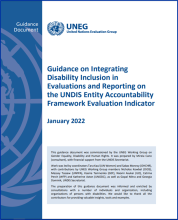
|
| Applying Evaluation Criteria Thoughtfully This guidance aims to help evaluators and others to better understand those criteria, and improve their use. It starts by describing what they are, and how they are meant to be used. Then the definitions and concepts underpinning each criterion are explained. Finally, examples provide the reader with concrete ideas for using them. The criteria were originally laid out in the early 2000s by the Network on Development Evaluation (EvalNet) of the OECD Development Assistance Committee (DAC). Although they have been widely used in evaluation, and beyond, this document is the first to comprehensively explore the concepts in detail, explain their intended use and offer practical guidance. It captures current thinking and best practice in evaluation, drawing on the inputs of internationally renowned evaluation experts from EvalNet and beyond. English |
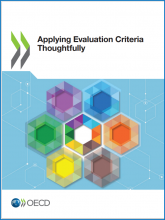
|
| UNEG Ethical Guidelines for Evaluation In 2008, the United Nations Evaluation Group (UNEG) formally approved its Ethical Guidelines in Evaluation and Code of Conduct for Evaluation in the UN System. This document constitutes the revised Ethical Guidelines for Evaluation. The ethical principles outlined below are firmly grounded in, and build on, the 2016 UNEG Norms and Standards for Evaluation that provide the agreed normative principles to be upheld in the conduct, management and governance of evaluation. English |
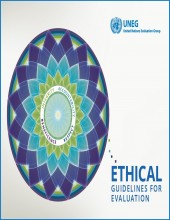
|
| UNEG Integrating Human Rights and Gender Equality in Evaluations This Guidance has been developed in response to the results of a mapping study conducted to determine the level of integration of HR & GE approaches in evaluations carried out in UN agencies, funds, programmes and training institutions (hereafter referred to as ‘UN entities’). This Guidance is aimed at increasing knowledge on the application of these two approaches in evaluation processes but also at raising awareness on their specific relevance and significance for UN work. English |
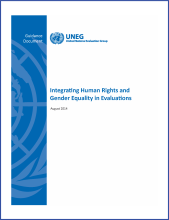
|
| UNEG Impact Evaluation in UN Agency Evaluation Systems: Guidance on Selection, Planning and Management This Guidance Note, used in conjunction with many other recent resources on impact evaluation, provides a sound starting point for UN evaluation bodies wishing to commence conducting impact evaluations. English |

|
| UNEG Norms and Standards for Evaluation The updated Norms and Standards were discussed and unanimously adopted at the April 2016 UNEG Annual General Meeting in Geneva. The 2016 Norms and Standards are interrelated and mutually reinforcing. The ten general norms should be upheld in the conduct of any evaluation; the four institutional norms should be reflected in the management and governance of evaluation functions. The associated standards support the implementation of these normative principles. English |
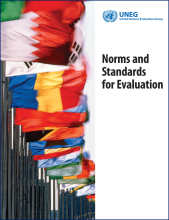
|
